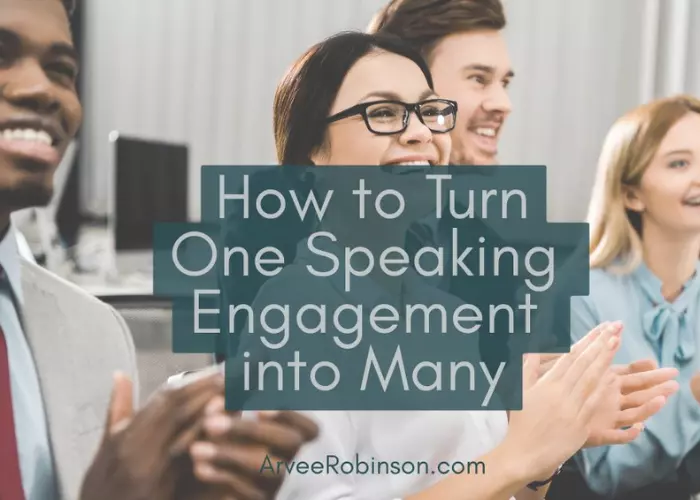Pro Tips to Turn One Speaking Engagement into Many

Just like getting a new customer, it takes time, energy, and expense to get a new speaking engagement. In sales, we’ve all heard, it is easier to nurture customers and have them be repeat customers. Speaking engagements are the same. It’s much easier to nurture a host and the individuals that invited you to speak than to hit the pavement to get new speaking opportunities. So, how do you get asked back after you speak and get more opportunities to speak?
Here are seven easy ways to attract repeat and new invitations to speak.
Jump To Section

Earn As You Learn
Earn 25% commission when your network purchase Uplyrn courses or subscribe to our annual membership. It’s the best thing ever. Next to learning,
of course.
Respond promptly to the event organizer
When the speaker opportunity comes and you’ve decided it’s for you and you’ve asked all the appropriate questions, the event planner will ask you for your bio, one-sheet, photo, title of your talk, and your three bullet points. You need to turn that request around within 24 hours. There is nothing more frustrating to an organizer than having to chase you and ask for this information repeatedly. By waiting to send this information could make the event host think you don’t really want the speaking engagement.
Prepare your speech
Treat this speaking engagement like gold. Prepare ahead of time and don’t wait until the last minute to throw something together or simply repurpose an old speech. Get ready early. For details on how to prepare, read this blog on how to practice and stand out as a master speaker.
Arrive early to the event
Set up your stage. Give your speaker introduction to the speaker organizer. Get yourself ready. You can get all these things in order only if you arrive early. I’ve seen what happens when a speaker comes in late. Everyone was waiting. The meeting is held up. The organizer tries to do another activity to buy time while waiting for the individual to come in. Not a good practice. Plan to be there a minimum of 30 minutes ahead of time if not an hour. You are part of the event. Think about when the president or event planner will be there. Early to set up. That’s when you want to be there. Help them set up. They will love you for that. You have prevented them from having anxiety about your showing up. You’ll also have special alone time with them to build trust and rapport.
Start with gratitude
When you start your presentation be sure to PUBLICLY thank the person who invited you. Use their first and last name and say, ‘I want to thank DEBBIE SMITH for inviting me here to speak. Let’s give her a big hand.” Everyone is there because they love their leader, and they love it when you pay respect to their leader. They will happily applaud. Don’t wait until the end of your presentation to thank them. Do it upfront.
Deliver an excellent presentation without notes
Be authentic and be in the moment. Build trust and rapport with your audience, involve them, and deliver the best content you have.
End on Time
Every meeting has an agenda. Stay on time. Stay on point. Make sure you time yourself during your talk so you can end on time. Wear a watch or bring a clock. Don’t ask anyone to time you (especially the leader or a member of the audience – because you’ve just taken away their pleasure in listening to you and taken away any rapport you’ve just built). If they are timing you, then they aren’t paying attention to you. You are the speaker, and you are responsible for your own time. Do whatever you need to do to end on time.
Connect with the host right after your talk
After the meeting ends, go to the event host and ask them if they enjoyed your presentation. Take a few minutes to chat with them about your talk. You could start by saying, “It seems like the audience enjoyed it.” Typically, the host will be very grateful for your speech. At this point, their heart is open and it’s a great time to ask them if they know of any other organization that would like to have you come and speak. It could be a sister organization or maybe they can give you a name of someone to contact. Just ask for one. You could ask, “Do you have the name or phone number of the leader of another organization who might like this same presentation?” Don‘t be pesky, just be inquiring. The best time to ask them is when they are happy, excited, and grateful for you. If they say they are busy, “I’ll get it to you later,” then the next day, be sure to reach out to them while you’re still hot on their mind. Don’t wait until this window of good energy goes stone cold.
That’s how you turn one speaking engagement into many.
You can also check out my Public Speaking Mastery online course here.


Leave your thoughts here...
All Comments
Reply